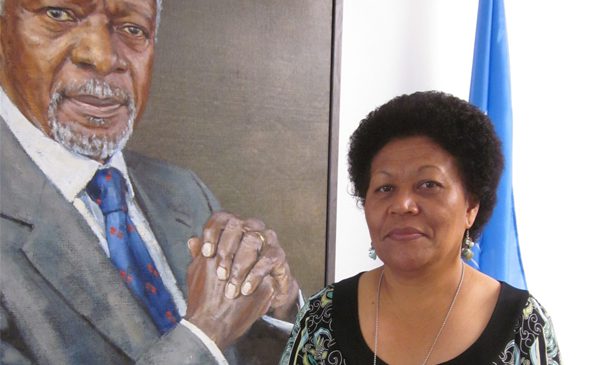
With the Third Session of the Arms Trade Treaty PrepCom well underway, we continue to take a look at one of the most positive developments this week – a record high turnout of both government and civil society representatives from the Pacific region. Previously the least represented region at the ATT PrepComs, the Pacific delegates have been playing a visible role, articulating what they want to see from an ATT and meeting with other delegations from Africa and the Caribbean to discuss areas of common interest.
We speak with Ema Tagicakibau from Fiji, a long time ATT campaigner, on what the ATT means for her and why she has come to New York to advocate for the Pacific region.
Tell us about yourself.
I’m a wife, mother, activist and campaigner for peace, security and disarmament in the Pacific, in small arms, cluster bombs, nuclear disarmament. I’ve been an active member of the NGO and women’s rights movement in Fiji for many years. I was also a former Member of Parliament in the Peoples Coalition government, elected in 1999, and served as Assistant Minister in the Prime Minister’s office. I now live with my family to Auckland, New Zealand where I’m currently utilising my time to begin a doctoral study focusing on gender and militarization in Fiji and its implications on human security in the Pacific region. This is important change in direction for me because I believe that advocacy by civil society is backed up by strong research and data, so we are coming from a more informed and strengthened position.
Why does the problem of small arms and arms control matter to you? How did you get involved in this issue?
Arms control is very critical in my personal life and professional career. I have seen the harm and destruction that the misuse of arms has done to my country Fiji, now into the fifth year of its third coup d’etat. When I was an MP back in 2000, the civilian coup led by George Speight happened. I was held at gunpoint with my colleagues and witnessed the attitude of the soldiers and boys carrying guns.
So to me, it is both a personal and professional commitment to ensure that an effective and strong ATT takes account of the abuse of power and human rights violations by those legally entrusted to carry arms and respect for the rule of law.
What would an effective ATT mean for the Pacific region?
It would ensure uniformity of laws to ensure there are no loopholes that allow unscrupulous arms traders to manipulate or exploit gaps that currently exist. An effective ATT would create control mechanisms where they don’t exist , and strengthen existing ones. It would also create transparency and accountability in the regional arms trade and address humanitarian and human rights concerns.
What role must the Pacific play?
This week’s negotiations have proven exciting for our region. Governments in the Pacific are getting more and more involved in the negotiations and have sent more experts from their capitals than ever before. This is in no small part thanks to the efforts of local civil society organisations and individuals that have worked for years to raise the profile of the small arms problem in the political arena. To ensure that this work translates into a meaningful treaty that makes a difference in our region, we must continue to work closely with our governments to ensure that this commitment to the ATT is sustained up to and beyond next year’s negotiating conference.